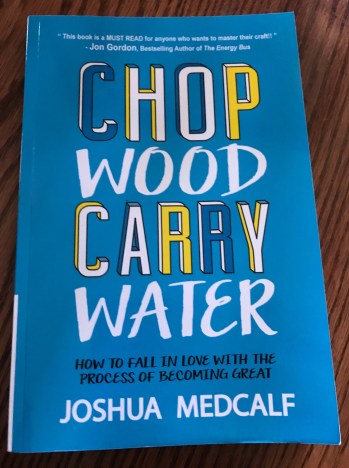Author: Joshua Medcalf

I don’t have a goal.
This stark realization hit me pretty hard a couple months ago. Probably for the first time ever in my life, I was not actively pursuing any tangible, defined goal. I’d always had something I was working toward. I had been grinding on my degree, working for my next assignment, learning to fly anything new with wings (or rotor blades), having children, or trying to buy a house.
What is next?
I tried out many things that felt like goals – Crossfit, keto, yoga, lifting, a short insta-pot obsession, cyclecross, volunteering at the school, swimming laps, running, wine tasting…
Was I just speed-dating hobbies?
I started to think about my goals differently after reading Joshua Medcalf’s book, “Chop Wood, Carry Water.” Medcalf’s main character, John, is on a journey to achieve his life-long goal of becoming a samurai warrior. John clearly wants to become a warrior more than anything else and is prepared to dedicate years of his life to reach his goal.
The book is probably best described as a collection of parables, broken into chapters. John’s sensei, Akira, guides him along the path to becoming a warrior. Akira helps John see that being a samurai means more than learning how to fight. With each chapter, John learns to value discipline, wrestles with his ego, experiences failure, and finally — submits to the process — all to achieve his goal.
Submit to the process…
When I looked back at my goals achieved, yes – those few days marking the completion of a goals were certainly important milestones. But what stuck with me more about my achievements, were all the little moments along the way. Difficult exams, hard fought races, endless nights with crying infants, perfectly blue skies, landings I won’t forget from missions I cannot forget, and all the sunsets – in all the places!
Medcalf’s book reminded me that what mattered most wasn’t any goal I set out to achieve, but rather, how I got there. The process and the journey mattered far more than the outcome.
I am still pretty sure that I don’t have a goal. I am certainly still trying out hobbies. But now, I strive to enjoy every moment because it is these moments that matter. The faces of my kids when I surprise them at school, or the boundless joy of my dog when he hears the word “walk,” or the way my son still likes to snuggle up and watch a movie — this is my journey.
These moments are the process and the process is my goal.









